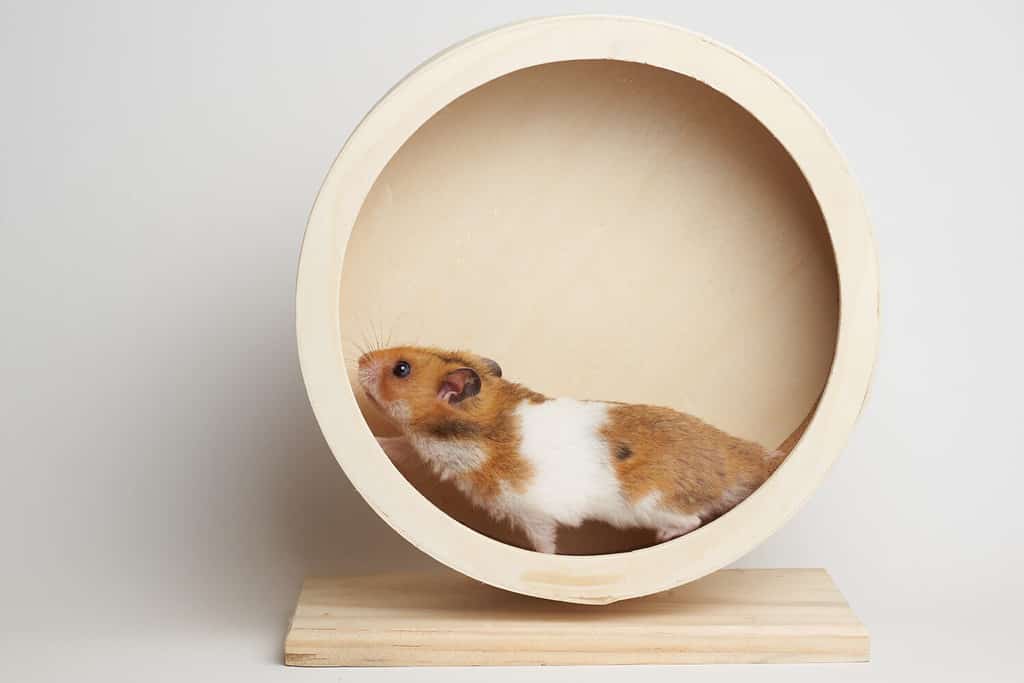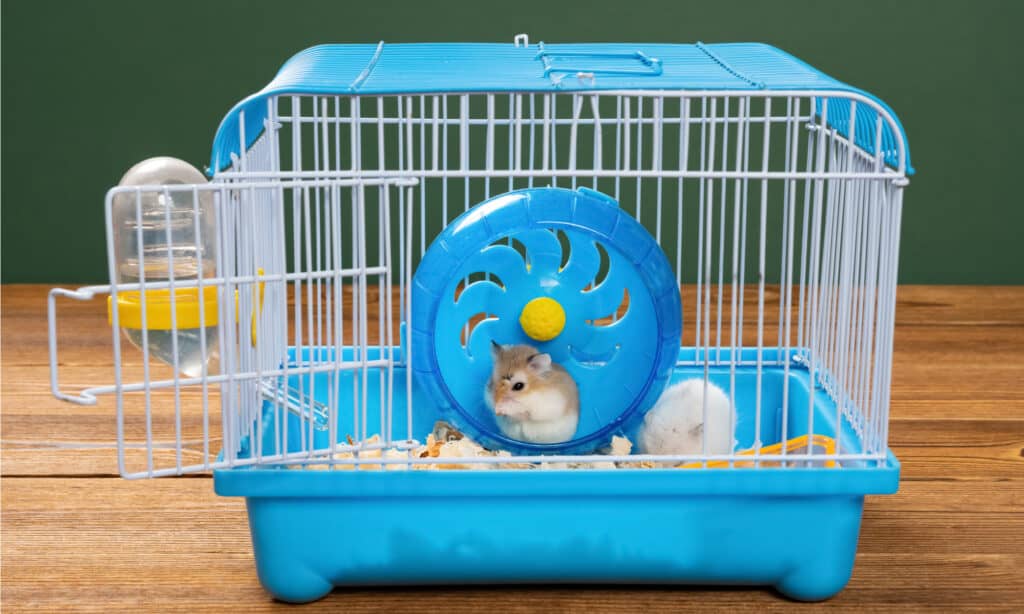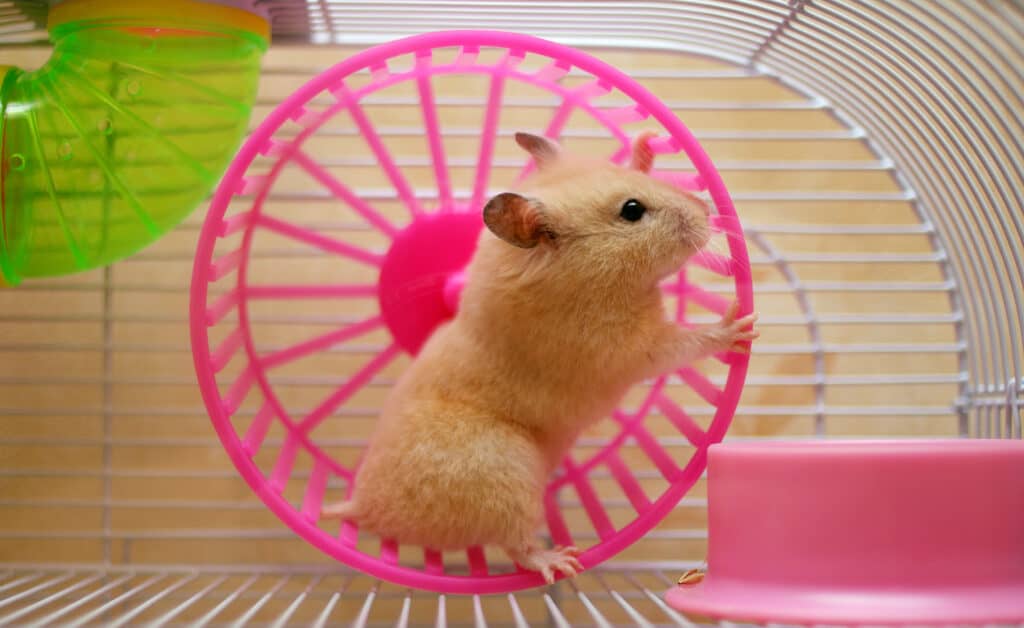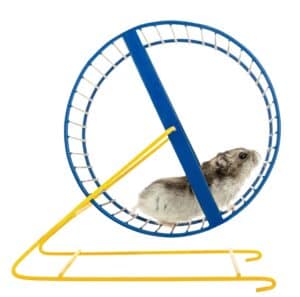Hamsters have long been associated with the wheels they run on. A hamster wheel is often viewed as just as essential as a water bottle. These small rodents spend hours running on their wheel to release energy, stay active, and prevent boredom.
Even the largest cage won’t stop a hamster from using their wheel, and some can make it an obsessive habit. Without a doubt, hamsters love running on wheels, but many hamster owners are stumped as to why they love these wheels so much. Discover why these adorable rodents enjoy their tiny treadmills!
What Is a Hamster Wheel?

An upright hamster wheel is a popular favorite amongst hamsters.
©Johannes Menge/Shutterstock.com
A hamster wheel is a piece of exercise equipment made from either metal, mesh, wood, plastic, or acrylic. The axel turns the wheel as a hamster runs. Many types of hamster wheels are available, but some are higher quality and safer than others.
The main types of hamster wheels include the free-standing or flying saucer wheel. A free-standing wheel is used in an upright position and can either be attached to the bars of a hamster cage or stabilized with a stand. Flying saucers are low-lying disc-shaped wheels that hamsters can run on from all angles. Hamster wheels are found in many different sizes, but the large and smooth-surfaced wheels are the safest.
Why Do Hamsters Run On Wheels
Hamsters are active rodents that can run up to six miles (10 kilometers) each night in the wild. During the day, wild hamsters will spend time in their burrows safe from predators and unfavorable weather conditions. Between dusk and dawn, these crepuscular animals will run for miles in search of food and water. Each of the five domesticated hamster species can be found in the wild, so their natural instinct to run hasn’t dwindled in captivity. This explains why hamsters will run on wheels, as they are used to it.
They can spend hours running on their wheel while you are sleeping, and it is a great way for them to release their pent-up energy and stay entertained. Exercise is important for hamsters, which is why they need a suitable wheel in their cage at all times. Without a wheel, hamsters can become bored and start showing destructive behaviors like bar chewing or climbing.
Do Hamsters Enjoy Running On Wheels?

Small wired cages are usually sold with a hamster wheel which is unsuitable for them to run on.
©Freer/Shutterstock.com
Yes, one of the main reasons hamsters will use their wheels often is because they enjoy it. Running is a normal behavior for hamsters that comes naturally to them. Most hamster cages above the minimum recommended size are still not large enough for these rodents who are used to extensive wild landscapes. However, it is still important to ensure your hamster has a large cage with over 700 square inches of floor space.
A wheel should never be used in replacement of a proper-sized hamster cage, although it might seem unnecessary. Hamsters require both an exercise wheel and a spacious cage to thrive.
Do Hamsters Need To Run On Wheels?
Hamsters absolutely need to run on wheels because it is their exercise requirement. Hamster wheels not only allow your hamster to do an activity they enjoy but offer both mental and physical stimulation to prevent boredom. Hamsters love to run and taking their wheel away from them can be stressful.
The only times you should not let your hamster run on a wheel is if it has been advised by their veterinarian. You might also need to remove the wheel if your hamster has just given birth to avoid injuries to her pups.
Why Won’t My Hamster Run on Their Wheel?
If you have a wheel in your hamster’s cage but find that they are not using them, there are three likely reasons why.
1. The Wheel is Too Small

A hamster’s back should never curve or form a “C” shape as they run.
©AlexKalashnikov/Shutterstock.com
Unfortunately, many pet stores and online retailers stock unsuitable hamster wheels that are too small for any species. Small hamster wheels are often sold with tiny, wired hamster cages, which are not good for hamsters. If your hamster’s wheel is too small, they are unlikely to run on it. Keep in mind that Syrian hamsters need at least a 10-to-12-inch wheel, whereas the smaller species require one above 8 inches.
2. The Wheel is Uncomfortable
Hamster wheels have different surfaces which might be uncomfortable for them to run on. Mesh or barred wheels are hard on a hamster’s paws and can cause injuries, ultimately leading to painful conditions like bumblefoot. Hamsters should only run on smooth wheels, although a few running indentations for traction are safe.
Alternatively, the wheel could be too small and uncomfortable for your hamster to run on. A curved back is not a comfortable position for any hamster to run in and may lead to painful spinal injuries in the future.
3. Your Hamster is Running on it at Night
As we have already discussed, hamsters are crepuscular animals that are awake between dusk and dawn. Most hamsters will awake when you are sleeping, and the house is dark. This is when they usually choose to run on their wheel, as it is what they would do in the wild. If your hamster’s wheel is already large and comfortable on their feet, they are probably using it when you are not looking. This is quite normal for shy hamsters too, who might prefer to hide in their burrow when you are around.
Pros and Cons of Hamster Wheels
| Pros | Cons |
|---|---|
| Helps them release energy. | Unsuitable wheels may injure your hamster. |
| Prevents boredom. | Hamster pups or those with neurological problems may get injured from wheels. |
| May have cognitive benefits like reducing stress. | |
| Allows them to exercise and keep fit. | |
| They enjoy running on them. | |
| May have cognitive benefits like reduce stress. |
How Long Do Hamsters Run on Their Wheels?
Most hamsters will run on their wheel for two to eight hours per night. However, some hamster owners have observed their hamsters running for more than 10 hours. It seems that younger hamsters might spend more time on their wheels than seniors. Hamsters may run on their wheel less often as they age and spend more time sleeping instead.
In Conclusion
Not only do hamsters need wheels for proper exercise, but they also gain tons of pleasure from running on these little wheels. All hamsters should have access to a safe and large wheel that allows for comfortable running. Hamsters are more likely to run at night than during the day, so plan accordingly to avoid listening to a squeaky wheel all night.
The photo featured at the top of this post is © Johannes Menge/Shutterstock.com
Thank you for reading! Have some feedback for us? Contact the AZ Animals editorial team.







